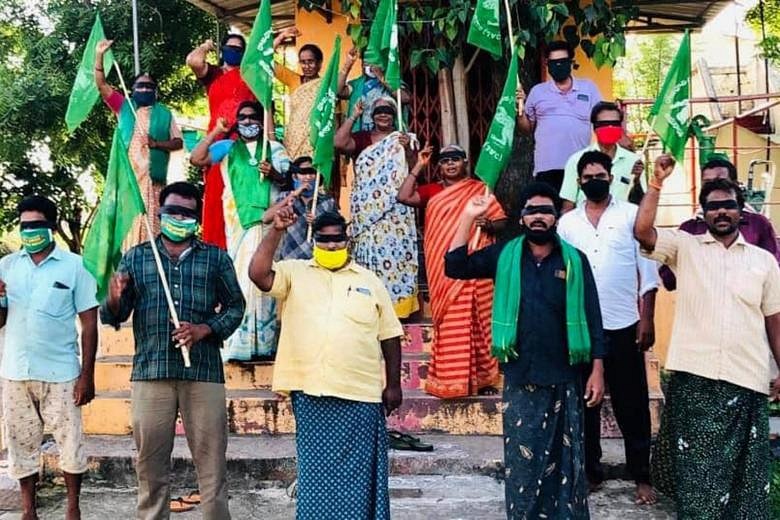BANGALORE - Zoom meetings, WhatsApp calls and selfies of each family at home, wearing masks and holding banners: This is how farmers who gave up their lands for the capital city of Amaravati are now protesting its cancellation.
"We have been protesting since the government decided to shift the capital and throw us into uncertainty. July 23 was our 220th day of agitation," said Mr Chalapati Rao, a well-to-do farmer whose family gave 30ha towards building the new capital.
The southern state of Andhra Pradesh was planning to build Amaravati, a high-tech capital city, out of 29 fertile riverside villages. Singapore companies were drawing up the masterplan. Thousands of farmers contributed their farmland for the project, while some refused.
But then Chief Minister Y. S. Jagan Mohan Reddy, who was elected last year, cancelled the project saying it was too ambitious and unnecessarily expensive for a state neck deep in debt. Last November, the state mutually agreed to terminate a contract with a consortium of Singapore real estate companies.
Discussions over the location of the capital have been going on since 2015, when Andhra Pradesh was divided into two - Telangana and Andhra Pradesh. They were to share Hyderabad city as their capital until a new one was found.
On Dec 17 last year Mr Reddy announced that he would create three capitals: the coastal city of Vishakapatnam is set to be the executive capital, with administrative offices; Kurnool will be the judicial capital, with courts; and Amaravati will be the legislative capital, with the assembly and secretariat.
Mr Reddy said this would ensure decentralised development.
Since then, the Amaravati Farmers United Council representing about 24,000 farmers of the capital region, has been on the warpath. The group has led protest marches and rallies against the three-city plan.
"We demand that the government should not keep changing its policies with each election. Just develop Amaravati here and don't cheat us," said Mr Rao, who is also a member of the council.
The protests have gone virtual since March 22, when social distancing norms were imposed nationwide to battle the Covid-19 pandemic. Farmers tweet to ministers, call local government officials by turn, and share photos of "mini-agitations" in their houses on WhatsApp.
On the 200th day, they held a Zoom session with non-resident Telugu-speakers attending from 35 countries.
The state's previous chief minister, Mr Chandrababu Naidu, had planned to build the capital in Amaravati from scratch by the Krishna River. He acquired 90 per cent of the 15,617ha required for his project through an unusual pooling system, offering a developed plot in the future city as payment to each landowner.
Most of those who gave up their land voluntarily were large landholders, like Mr Rao, who admitted that his educated children held other professions and had no interest in continuing farming. Some of the farmers trusted and supported Mr Naidu's party, which is now in the opposition.
The capital area's development progressed slowly, as it was mired in litigation about encroaching river floodplains and the World Bank refused a loan over allegations of farmers being coerced to give their land. Other than for two universities, the region did not receive much private investment either.
Finally, the new government passed laws to repeal the old plan and build three capitals, unprecedented for any state in India.
"The earlier government pegged the cost estimate of building Amaravati's basic infrastructure at 1,090 billion rupees (S$20.2 billion), while the spending capacity of any state government is only five billion rupees. At 10 per cent of the estimated cost, we can develop places that already have basic infrastructure into capitals," Mr Reddy said.
After protesting farmers met him in February, the government extended their period for receiving annuity - towards agricultural income lost - from 10 to 15 years. Farmers said the lands taken can't be returned because they are already divided into plots, which the chief minister said could be sold in the future. He also clarified that the new legislative assembly would continue to function from Amaravati.
But the farmers are not satisfied. Mr P. Sheshababu, whose village of Nalapadu was the first to give its lands for the capital, said: "Only if the full capital is here will this area develop. After promising us a capital and better land prices in the future, we will now get much less even if we sell."
This week, some farmers held a press conference wearing face shields, and said they had written to the governor asking him not to approve the law to build the three capitals.
"We will do what it takes, even through the pandemic," said Mr Rao.



